(完整word版)初中英语总复习材料(仁爱版).doc
(完整word版)初一英语语法知识点总结复习超详细,推荐文档
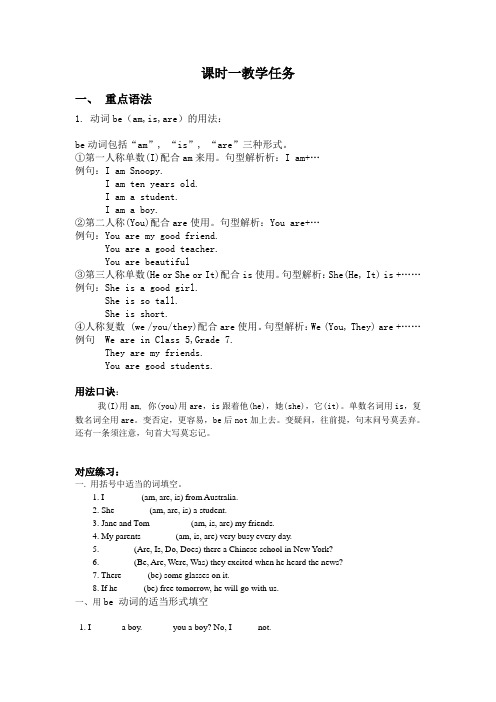
课时一教学任务一、重点语法1.动词be(am,is,are)的用法:be动词包括“am”, “is”, “are”三种形式。
①第一人称单数(I)配合am来用。
句型解析析:I am+…例句:I am Snoopy.I am ten years old.I am a student.I am a boy.②第二人称(You)配合are使用。
句型解析:You are+…例句:You are my good friend.You are a good teacher.You are beautiful③第三人称单数(He or She or It)配合is使用。
句型解析:She(He, It) is +……例句:She is a good girl.She is so tall.She is short.④人称复数 (we /you/they)配合are使用。
句型解析:We (You, They) are +……例句 We are in Class 5,Grade 7.They are my friends.You are good students.用法口诀:我(I)用am, 你(you)用are,is跟着他(he),她(she),它(it)。
单数名词用is,复数名词全用are。
变否定,更容易,be后not加上去。
变疑问,往前提,句末问号莫丢弃。
还有一条须注意,句首大写莫忘记。
对应练习:一. 用括号中适当的词填空。
1. I ________(am, are, is) from Australia.2. She _______ (am, are, is) a student.3. Jane and Tom _________(am, is, are) my friends.4. My parents _______ (am, is, are) very busy every day.5. _______ (Are, Is, Do, Does) there a Chinese school in New York?6. _______ (Be, Are, Were, Was) they excited when he heard the news?7. There _____ (be) some glasses on it.8. If he _____ (be) free tomorrow, he will go with us.一、用be 动词的适当形式填空1. I ______ a boy. ______ you a boy? No, I _____ not.2. The girl______ Jack's sister.3. The dog _______ tall and fat.4. The man with big eyes _______ a teacher.5. ______ your brother in the classroom?6. Where _____ your mother? She ______ at home.7. How _______ your father?8. Mike and Liu Tao ______ at school.9. Whose dress ______ this?10. Whose socks ______ they?11. That ______ my red skirt.12. Who ______ I?13.The jeans ______ on the desk.14.Here ______ a scarf for you.15. Here ______ some sweaters for you.16. The black gloves ______ for Su Yang.17. This pair of gloves ______ for Yang Ling.18. The two cups of milk _____ for me.19. Some tea ______ in the glass.20. Gao shan's shirt _______ over there.第二课时(1)英语人称代词和物主代词一、人称代词表示“我”、“你”、“他”、“她”、“它”、“我们”、“你们”、“他们”的词,叫做人称代词。
最新仁爱版七年级英语下册期末知识点总复习
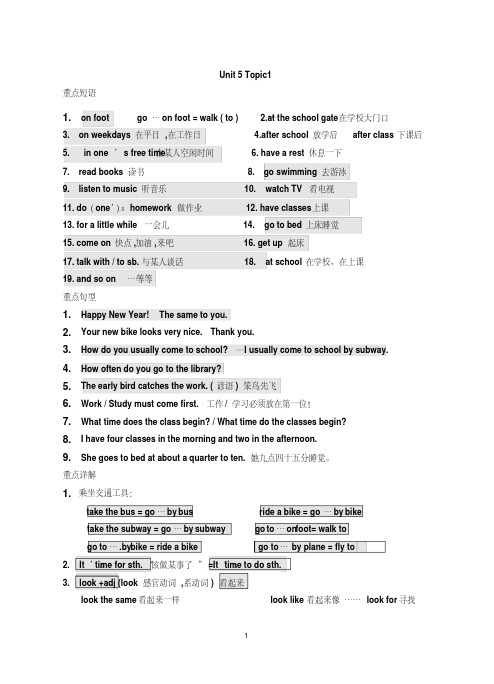
Unit 5 Topic1重点短语1.on foot go …on foot = walk ( to )… 2.at the school gate在学校大门口3. on weekdays 在平日 ,在工作日4.after school 放学后after class 下课后在某人空闲时间 6. have a rest 休息一下5. in one’s free time7. read books 读书8. go swimming 去游泳9. listen to music 听音乐10. watch TV 看电视11. do(one’s)homework 做作业12. have classes 上课13. for a little while 一会儿14. go to bed 上床睡觉15. come on 快点,加油,来吧16. get up 起床17. talk with / to sb.与某人谈话18. at school 在学校、在上课19. and so on ……等等重点句型1.Happy New Year! The same to you.2.Your new bike looks very nice. Thank you.3.How do you usually come to school? —I usually come to school by subway.4.How often do you go to the library?5.The early bird catches the work. (谚语) 笨鸟先飞6.Work / Study must come first. 工作/ 学习必须放在第一位!7.What time does the class begin? / What time do the classes begin?8.I have four classes in the morning and two in the afternoon.9.She goes to bed at about a quarter to ten. 她九点四十五分睡觉。
仁爱英语九年级第一轮总复习材料(八下)
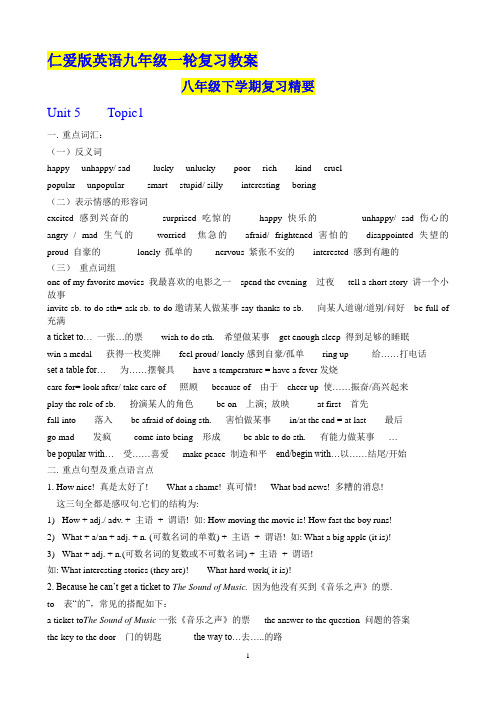
仁爱版英语九年级一轮复习教案八年级下学期复习精要Unit 5 Topic1一.重点词汇:(一)反义词happy----unhappy/ sad lucky----unlucky poor----rich kind----cruelpopular----unpopular smart----stupid/ silly interesting----boring(二)表示情感的形容词excited感到兴奋的surprised 吃惊的happy 快乐的unhappy/ sad 伤心的angry / mad 生气的worried 焦急的afraid/ frightened 害怕的disappointed 失望的proud 自豪的lonely 孤单的nervous 紧张不安的interested 感到有趣的(三)重点词组one of my favorite movies 我最喜欢的电影之一spend the evening 过夜tell a short story 讲一个小故事invite sb. to do sth= ask sb. to do邀请某人做某事say thanks to sb. 向某人道谢/道别/问好be full of 充满a ticket to… 一张…的票wish to do sth. 希望做某事get enough sleep 得到足够的睡眠win a medal 获得一枚奖牌feel proud/ lonely感到自豪/孤单ring up 给……打电话set a table for… 为……摆餐具have a temperature = have a fever发烧care for= look after/ take care of 照顾because of 由于cheer up 使……振奋/高兴起来play the role of sb. 扮演某人的角色be on 上演; 放映at first 首先fall into 落入be afraid of doing sth. 害怕做某事in/at the end = at last 最后go mad 发疯come into being 形成be able to do sth. 有能力做某事…be popular with… 受……喜爱make peace 制造和平end/begin with…以……结尾/开始二.重点句型及重点语言点1. How nice! 真是太好了! What a shame! 真可惜! What bad news! 多糟的消息!这三句全都是感叹句.它们的结构为:1)How + adj./ adv. + 主语+ 谓语! 如: How moving the movie is! How fast the boy runs!2)What + a/an + adj. + n. (可数名词的单数) + 主语+ 谓语! 如: What a big apple (it is)!3)What + adj. + n.(可数名词的复数或不可数名词) + 主语+ 谓语!如: What interesting stories (they are)! What hard work( it is)!2. Because he can’t get a ticket to The Sound of Music. 因为他没有买到《音乐之声》的票.to 表“的”,常见的搭配如下:a ticket to The Sound of Music一张《音乐之声》的票the answer to the question 问题的答案the key to the door 门的钥匙the way to…去…..的路3. I think Mr. Lee likes it very much and really wishes to watch it. 我认为李老师非常喜欢它而且的确想去看. wish/ hope to do sth.希望做某事,与wish 相关的结构还有: wish/ hope + that引导的从句; 如:I wish/ hope (that) we will win.我们可以说wish sb. to do sth. 而不能说hope sb. to do sth.;4. I’ll ring up Michael later. 稍后我打电话给迈克. 当宾语为代词时, 只能放中间.如: ring me/him/her upring up sb. = call/ ring/ phone sb. = give sb. a ring/ call/ telephone = make a telephone to sb.5. Michael isn't able to come.can与be able to 二者都表“能;会”,在指“一般能力”时,常互换。
仁爱英语九年级第一轮总复习材料(九上unit1)
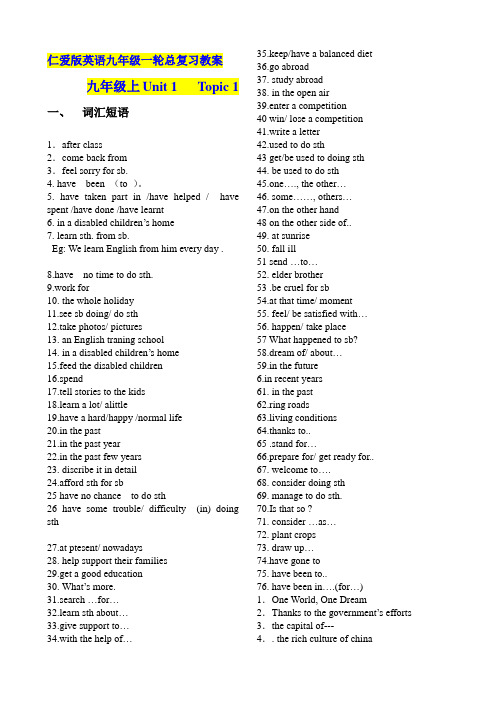
仁爱版英语九年级一轮总复习教案九年级上Unit 1 Topic 1 一、词汇短语1.after class2.come back from3.feel sorry for sb.4. have been (to )。
5. have taken part in /have helped / have spent /have done /have learnt6. in a disabled children’s home7. learn sth. from sb.Eg: We learn English from him every day .8.have no time to do sth.9.work for10. the whole holiday11.see sb doing/ do sth12.take photos/ pictures13. an English traning school14. in a disabled children’s home15.feed the disabled children16.spend17.tell stories to the kids18.learn a lot/ alittle19.have a hard/happy /normal life20.in the past21.in the past year22.in the past few years23. discribe it in detail24.afford sth for sb25 have no chance to do sth26 have some trouble/ difficulty (in) doing sth27.at ptesent/ nowadays28. help support their families29.get a good education30. What’s more.31.search …for…32.learn sth about…33.give support to…34.with the help of…35.keep/have a balanced diet36.go abroad37. study abroad38. in the open air39.enter a competition40 win/ lose a competition41.write a lettered to do sth43 get/be used to doing sth44. be used to do sth45.one…., the other…46. some……, others…47.on the other hand48 on the other side of..49. at sunrise50. fall ill51 send …to…52. elder brother53 .be cruel for sb54.at that time/ moment55. feel/ be satisfied with…56. happen/ take place57 What happened to sb?58.dream of/ about…59.in the future6.in recent years61. in the past62.ring roads63.living conditions64.thanks to..65 .stand for…66.prepare for/ get ready for..67. welcome to….68. consider doing sth69. manage to do sth.70.Is that so ?71. consider …as…72. plant crops73. draw up…74.have gone to75. have been to..76. have been in….(for…)1.One World, One Dream 2.Thanks to the government’s efforts 3.the capital of---4.. the rich culture of china5.as well6.with the help of =with one’s help.7.divide my money into two parts.8. at that time/on that day9. --enough--- to do sth.10.made such rapid progress11. write an article about12.the Chinese teenagers’ lives二、重点句子1.Did you have a good summer holiday?2.How was your trip?3.In one place I saw children working for acruel boss.4.I felt sorry for them.5.A: Where have you been, Jane?B: I have been to Mount Huang with my parents.6.A: Where has he/she / kangkang been?B: He has been to an English training school to improve his English.7.There goes the bell。
【暑假作业】仁爱版七年级英语暑假总复习及部分答案
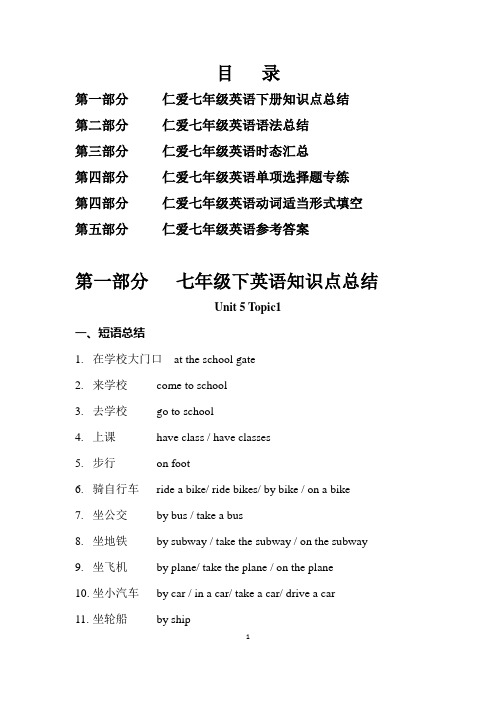
目录第一部分仁爱七年级英语下册知识点总结第二部分仁爱七年级英语语法总结第三部分仁爱七年级英语时态汇总第四部分仁爱七年级英语单项选择题专练第四部分仁爱七年级英语动词适当形式填空第五部分仁爱七年级英语参考答案第一部分七年级下英语知识点总结Unit 5 Topic1一、短语总结1. 在学校大门口at the school gate2. 来学校come to school3. 去学校go to school4. 上课have class / have classes5. 步行on foot6. 骑自行车ride a bike/ ride bikes/ by bike / on a bike7. 坐公交by bus / take a bus8. 坐地铁by subway / take the subway / on the subway9. 坐飞机by plane/ take the plane / on the plane10. 坐小汽车by car / in a car/ take a car/ drive a car11. 坐轮船by ship12. 坐小船by boat13. 坐火车by train / on the train14. 在我们组in our group15. 一群学生 a group of students16. 我们中的三个人three of us17. 在平日on weekdays18. 在周末on the weekends / at weekends19. 起床get up20. 睡觉go to bed21. 早起get up early22. 回家go home23. 到家get home24. 去动物园go to the zoo25. 去公园go to the park26. 看电影see a movie / film27. 看电视watch TV28. 在晚上in the evening / at night29. 帮助父母help parents30. 做某人的家庭作业do one’s ( my/ her/ his/ your/ their)homework31. 在学校at school32. 知道,了解know about / learn about33. 校园生活school life34. 一个美国学生an American student35. 在美国in America / in the U.S.A.36. 许多学生many students/ a lot of students/ lots of students37. 很少very few38. 吃午饭have lunch39. 出去吃饭eat out40. 在校期间on school days41. 休息一会have a short rest/ break42. 午饭后after lunch43. 在某人的业余时间in one’s ( my/ his/ her/ their…)free/ spare time44. 打篮球play basketball45. 踢足球play soccer / football46. 弹钢琴play the piano47. 弹吉他play the guitar48. 拉二胡play erhu49. 去游泳go swimming / go for a swim50. 去划船go boating51. 球赛a ball game / ball games52. 一年四次four times a year53. 听音乐listen to music54. 读书read books55. 看报read newspapers56. 看医生see a doctor57. 去图书馆go to the library58. 一周两次twice a week59. 见朋友meet friends60. 每天every day61. 在七点半at half past seven62. 一小会for a little while / for a short time63. 晚饭后after supper64. 吃饭have dinner65. 吃早饭have breakfast二、重要句型1. I usually come to school by subway.同义句: I usually take the subway to school.对划线部分提问: How do you usually come to school?类似的有:go to school by bike=go to schoolon a bike= ride a bike to school=ride to schoolgo home by bus=go home on a bus=take a bus home2. How do you usually/ often…?你通常/经常怎样…?3. It’s time for class.=It’s time to have class. =It’s time for having class.4. What about you? =How about you?5. How often …? 询问频率,回答可以用频率副词:always, usually,often, sometimes, seldom, never, every day ,every +其他时间名词或表示频率的短语回答表示频率的短语:次数+单位时间e.g. : once a day / twice a week / three times a month6. The early bird catches the work. (谚语) 笨鸟先飞7. Work / Study must come first. 工作/ 学习必须放在第一位!8. Classes begin at eight. =Class begins at eight.提问:What time does the class begin? / What time do the classes begin?三、重要单词的用法1. look (感官动词) 看起来,后面加形容词His mother looks very young.They look very cute.Her dress looks very nice.You look very cool in this coat.2. by 介词by 后面直接加表示交通工具的名词,中间不用任何词修饰,如:by bikeby +动词ing形式,表示通过某种方式People show love to their mothers by giving cards.You can be a good student by working hard.3. over (形容词)School / Class is over.4. begin现在分词: beginning 过去式: beganbegin to do sth , begin doing sthHe begins to write a letter. =He begins writing a letter.如果begin本身为分词,只能用begin to do sthHe is beginning to run.5. listen to 听(动作),hear 听见(结果)6. always 反义词never7. 本话题涉及的时态为一般现在时,句中常有频率副词或表示频率的短语,如果主语为三单,动词一定要用三单!四、易错题1. You new watch ______ (look) very nice!2. Here ______(be) some news.3. Oh, come on! It’s time_____ g oing to school.4. They usually go to school on ________(feet).5. In my class, forty of _______(we) go to school by bike.6. The early bird ______ (catch) the worm.7. Kangkang often _____ (ride) a bike to the park.8. What time _____ (be)school over?9. Work must come ______(once).10. It’s time ____you to get up.11. We often _____ books in the morning.12. Jill’s friend like ______(study) in our school.13. Mr. Wang teaches ______(we) English. _____ of us like him.14. How about ______(go) out with me?15. Most students go to school _____ the school bus.16. _______ do you go shopping with your mother?A. How soonB. How farC. How oftenD. How much17. What time do you usually get up _____ weekdays?18. He ______ busy, so he has no time to play with us.A. is alwaysB. seldom isC. always isD. often is19. The last class______(finish) at twelve o’clock.20. Let’s go______(boat).21. It’s time to have breakfast. (同义句)______________________________________________________.22. Michael often rides a bike to school. (同义句)______________________________________________________.23. I always go to work on foot. (对划线部分提问)______________________________________________________.24. My mother goes shopping twice a week. (对划线部分提问)______________________________________________________.25. Mary always reads books in the library. (反义句)______________________________________________________.26. He usually does his homework at school. (否定句)______________________________________________________.27. They often go to school by bus in the morning. (对划线部分提问) ______________________________________________________.28. Jane seldom watches TV on weekdays. (改为一般疑问句)______________________________________________________.29. He usually has lunch at home. (对划线部分提问)______________________________________________________.30. Li Ping often goes to work on foot. (同义句)______________________________________________________.31. 几乎没有学生乘地铁去学校。
(完整word版)仁爱版初中英语目录知识框架,2017
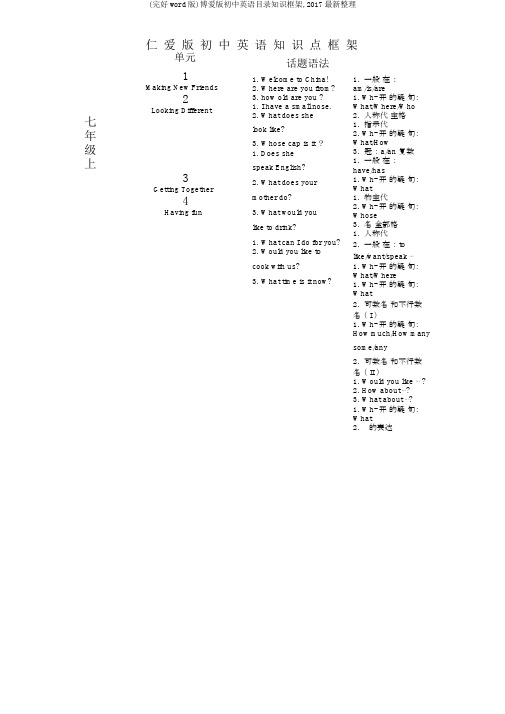
仁爱版初中英语知识点框架单元话题语法1Making New Friends2Looking Different 七年级上3Getting Together4Having fun 1.Welcome to China!2.Where are you from?3.how old are you ?1.I have a small nose.2.What does shelook like?3.Whose cap is it ?1.Does shespeak English?2.What does yourmother do?3.What would youlike to drink?1.What can I do for you?2.Would you like tocook with us?3.What time is it now?1.一般在:am/is/are1.Wh- 开的疑句:What/Where/Who2.人称代主格1.指示代2.Wh- 开的疑句:What/How3.冠: a/an 复数1.一般在:have/has1.Wh- 开的疑句:What1.物主代2.Wh- 开的疑句:Whose3.名全部格1.人称代2.一般在: tolike/want/speak ⋯1.Wh- 开的疑句:What/Where1.Wh- 开的疑句:What2.可数名和不行数名( I )1.Wh- 开的疑句:How much/How manysome/any2.可数名和不行数名( II )1.Would you like ⋯ ?2.How about ⋯?3.What about ⋯?1.Wh- 开的疑句:What2.的表达单元话题语法1. I usually come to1. 率school by subway?5 2. A few students arerunning around the 1. 在行Our School Life playground.3. My school life is very 1. 一般在interesting. 2. 在行1. there is a study next to 1. There is/aremy bedroom. 2. 介6 2. my home is in an1. There is/areapartment building.七Our Local Area年 3.how can I get to the 1. 介级library? 2. 祈使句1. 一般去( I)下 1. When is your 2. 基数birthday?3. 序数7 2. Can you sing an 1. 情: can/can'tcould/couldn'tEnglish song?The Birthday Party 2. 疑句3. everyone had a good1.一般去( II )time.1. What's the weather 1. 一般在2. 一般去like in spring?3. 构法8 2. The summer holidays 1.Want/plan/wish/hope/w The Seasons and the Weatherare coming. ould like to ⋯3. Let's celebrate!1. 复单元1Playing Sports2八Keeping Healthy年级上3Our Hobbies4Our World话题语法1. I am going to play 1. Be going to 构造的一basketball. 般未来时2. I will kick you the ball 1. Would/Do you mind again. doing sth?3. the school sports meet 1. Will 构造的一般未来is coming. 时1. You should brush your1. 神态动词( 1)teeth twice a day.2. I must ask him to give1. 神态动词( 2)up smoking.3. Must we do exercise to 1. 神态动词( 3)prevent the flu? 2. 反身代词1. What is your hobby? 1. Used to 过去经常2. What sweet music! 1. 叹息句3. What were you doing1. 过去进行时at this time yesterday?1. what is the strongest 1. 形容词的比较级和最animal on the farm? 高级2. how can we protect1. 形容词的比较级和最ourselves from the高级earthquake?3. The internet makes the1. 宾语补足语world smaller.单元话题语法1. you look excited. 1. 系 +形容5 2. I am feeling better 1. 原由状从句Feeling Excitednow. 2. 同比3. Many things can affect 1. 6 种句型our feelings.1. We're going on a 1. 不定式spring field trip.6 2. How about exploring 八Enjoying Cycling the tianmen Square?年 3. Bicycle riding is good 级exercise.下 1. We are preparing for afood festival7 2. I am not sure whether IFood Festivalcan cook it well.3. I cooked the mostsuccessfully.1. we will have a classfashion show.8 2. we can design our ownOur Clothesuniforms.3. he said the fashionshow was wonderful. 1.状从句1.条件状从句1.从句( I )1.从句( II )2.的比和最高( I )1.的比和最高( II )1.So⋯ that⋯2.So that⋯3.Such⋯ that⋯1.从句( III )1. 从句( IV )单元话题语法1The Changing World九2 Saving the Earth年级上3English around the World4Amazing Science 1.Our country hasdeveloped rapidly.2.The population indeveloping countries isgrowing faster.3.The world has changedfor the better.1.Pollution has causedtoo many problems.2.All these problems arevery serious.3.what can we do athome to protectthe environment ?1.English is widelyspoken throughoutthe world.2.some things usuallyhave different meaningsin different cultures.3.Could you give ussome advice on howto learn English well?1.When was it invented?2.I am excited aboutthe things that will bediscovered in the future.3.China is the thirdnation that sent aperson into space.1.在达成( I )Have/has done⋯Have/has been to⋯Have/has gone to⋯1.在达成( II )Already, yet, just, ever,never1.在达成( III )For, since2.构法1.直接引和接引1.不定代和副1.并列复合句 or, and,while, but1.被( I)am/is/are+ 去分1.在行表未来1. Wh-+to do1.被( II )was/were+ 去分1.被( III )will+be+ 去分1.定从句That/which/who单元5China and the world 九年级下6Entertainment andFriendship话题语法1. China attracts millions1. 定从句( I) that, of tourists from all overwhichthe world.2. He is really the pride 1. 定从句( II )of china. Who, whom, whose1. 接和主一致3. Now it is a symbol ofEither ⋯ or⋯Both ⋯ and⋯England.Neither ⋯ nor⋯Not only ⋯ but also⋯1. I would rather watchsports shows than thoseones.2. Who is your favoritecharacter in literature?3. I will remember ourfriendship forever.。
Unit 8 topic 1 --3总复习课件 仁爱版英语七年级下册
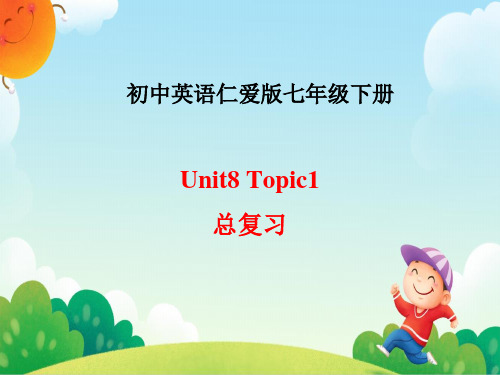
It’s a good season for flying kites./ to fly kites. 3、 春夏秋冬,你最喜欢哪个季节?
Which season do you like best,spring,summer,fall or winter? 4、 以前我喜欢冬天,但是我现在最喜欢夏天
5.In Australia,spring returns (return) in September.
词汇训练营
单词填空,考查综合运用能力!
根据语境及所给汉语提示写出句中所缺单词
1. Eric and his sisters want to take a(n) trip
(旅行)
to Yunnan.
16、当我们回到家时,天开始下雨
It began to rain when we got back home.
17、祝你身体健康
I hope all is well with you.
句型连连看
学以致用,你掌握了吗?
根据语境及所给汉语提示填空,每空一词
1. This is not the season for swimming (游泳的季节). 2.There is lots of rain (许多雨)in my city these days. 3.——Which movie do you like best?
初中英语仁爱版七年级下册
Unit8 Topic1 总复习
词汇集中营
词汇集中营
快速回忆所学单词,看谁说得又快又准!
请快速说下面的单词
1、季节 ( 春天 夏天 秋天 冬天)
九年级英语总复习阶段复习(七上)(无答案)仁爱版
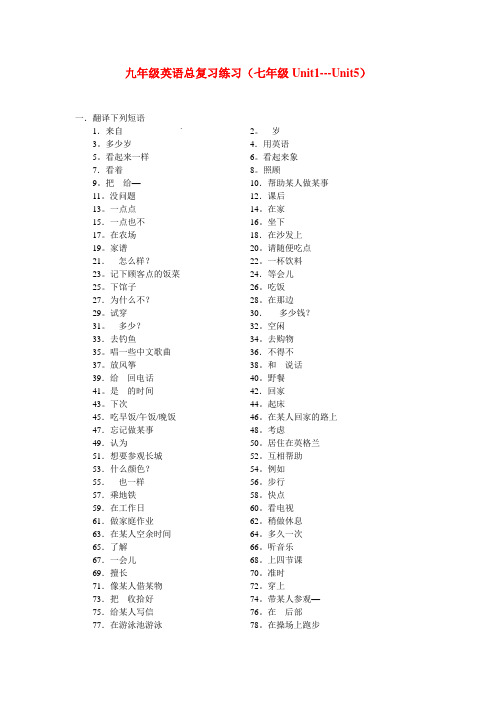
九年级英语总复习练习(七年级Unit1---Unit5)一.翻译下列短语1.来自` 2。
---岁3。
多少岁4.用英语5。
看起来一样6。
看起来象7.看着8。
照顾9。
把---给—10.帮助某人做某事11。
没问题12.课后13。
一点点14。
在家15.一点也不16。
坐下17。
在农场18.在沙发上19。
家谱20。
请随便吃点21.---怎么样?22。
一杯饮料23。
记下顾客点的饭菜24.等会儿25。
下馆子26。
吃饭27.为什么不?28。
在那边29。
试穿30.----多少钱?31。
---多少?32。
空闲33.去钓鱼34。
去购物35。
唱一些中文歌曲36.不得不37。
放风筝38。
和---说话39.给---回电话40。
野餐41。
是---的时间42.回家43。
下次44。
起床45.吃早饭/午饭/晚饭46。
在某人回家的路上47.忘记做某事48。
考虑49.认为50。
居住在英格兰51.想要参观长城52。
互相帮助53.什么颜色?54。
例如55.---也一样56。
步行57.乘地铁58。
快点59.在工作日60。
看电视61.做家庭作业62。
稍做休息63.在某人空余时间64。
多久一次65.了解66。
听音乐67.一会儿68。
上四节课69.擅长70。
准时71.像某人借某物72。
穿上73.把---收拾好74。
带某人参观—75.给某人写信76。
在---后部77.在游泳池游泳78。
在操场上跑步79.和某人交谈80。
结束81.做户外运动82。
对某人友好83.告诉某人某事84。
感谢某人做某事85.从---学到---- 86。
在学校踢足球二。
根据中文意思或首字母写出下列单词或短语。
1.Welcome to C______________________________! Thank you.2.Nice to meet you!Nice to meet you ,t______________________.3.How are you ?I‟m f________________________.Thank you!4.What‟s her n________________________ ?She is Jane.5.W__________________________ are you from? I‟m from Japan.6.How o_________________________ are you?I‟m twelve years old.7.Can you s__________________ “apple”?Yes,A-P-P-L-E ,apple.8.He has a phone.His phone n___________________ is 4562789.9.They are not in the same class,but they are good _________________ (朋友).10.What are ____________________ (这些)?They are English books.11.I have a ______________ (小的)nose,but he has a big one.12.____________________________(谁的)jacket is this? It‟s Li Ming‟s.13.I ___________________________________________ (认为) it‟s Jane‟s skirt.14.We look the same but we are in different __________________(.衣服)15.His pants are blue and mine are _______________________(白色的)16.She has a round face and bigs _____________________ (耳朵).17.His nose is very b__________ ,but his mouth is very small.18.Yoa Ming‟s legs are long,but Tom‟s legs are s________________.19.Meimei has a big head and a w_________________ mouth.20.They have k______________________________ to cut apples.21.---I‟m in Class One and Lee is in Class Two.---You are in d_________ classes.22.Li Ming doesn‟t like English and his English is p_____________.23. She works in a hospital .But she is not a doctor.What does she do?She is a _________.24.She works in a school.Her English is very well and she teaches English.What does she do ?She is a ________________________.25.He works in a factory(工厂),but he is not a boss.He is a _________________.26.He has a farm.He works on the farm .He is a ________________________.27.The man drives a bus every day(每天).He is a ____________________________.28.Xiao Ming studies in a high school.He is a ___________________________.29.Look! This is a photo of Jane‟s f_______________________________.30.When the baby see his mother ,he is very h______________________.31.Miss wang is teacher. She t___________________________ us English.32They are my father‟s parents.They are my g_______________________________.33.My son is o_________________________ two years old.But he is very c_____________.34.The man has a son and a d_______________________________ in his home.35.Look!The boy on the sofa is my c_______________________----My uncle‟s son.36.---How do you like the ________________ (裤子)?---They‟re too short.37.---What would you like then,Mr.Cat?---I‟d like a fat _______________ (老鼠)。
仁爱版英语中考常考知识点整理
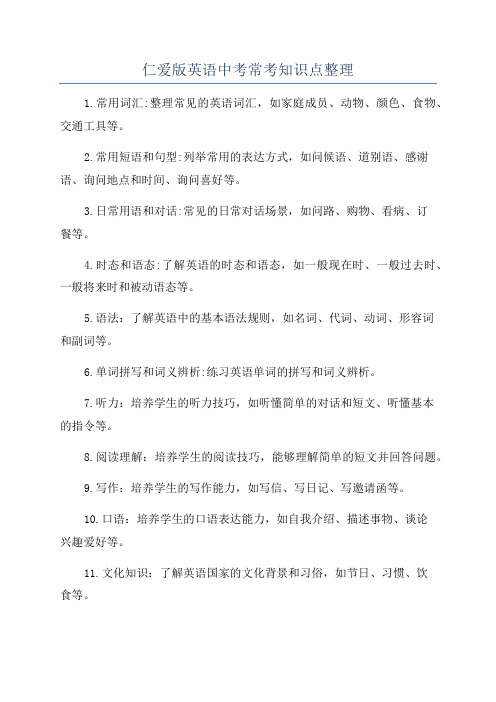
仁爱版英语中考常考知识点整理
1.常用词汇:整理常见的英语词汇,如家庭成员、动物、颜色、食物、交通工具等。
2.常用短语和句型:列举常用的表达方式,如问候语、道别语、感谢语、询问地点和时间、询问喜好等。
3.日常用语和对话:常见的日常对话场景,如问路、购物、看病、订
餐等。
4.时态和语态:了解英语的时态和语态,如一般现在时、一般过去时、一般将来时和被动语态等。
5.语法:了解英语中的基本语法规则,如名词、代词、动词、形容词
和副词等。
6.单词拼写和词义辨析:练习英语单词的拼写和词义辨析。
7.听力:培养学生的听力技巧,如听懂简单的对话和短文、听懂基本
的指令等。
8.阅读理解:培养学生的阅读技巧,能够理解简单的短文并回答问题。
9.写作:培养学生的写作能力,如写信、写日记、写邀请函等。
10.口语:培养学生的口语表达能力,如自我介绍、描述事物、谈论
兴趣爱好等。
11.文化知识:了解英语国家的文化背景和习俗,如节日、习惯、饮
食等。
总的来说,仁爱版英语中考考察的知识点涵盖了词汇、语法、听力、阅读、写作和口语等方面。
学生除了掌握这些知识点外,还需要通过大量的练习和实践来提升自己的英语能力。
仁爱版九年级unit单元语法知识点总复习有对应习题及答案
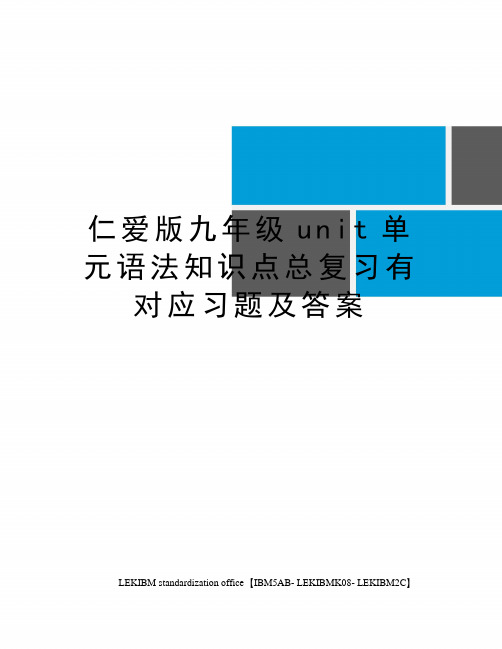
仁爱版九年级u n i t单元语法知识点总复习有对应习题及答案LEKIBM standardization office【IBM5AB- LEKIBMK08- LEKIBM2C】九年级英语Unit1单元归纳复习及相应课堂习题(含每个topic作文)1. Have/has been to, have/has gone to 和 have/has been in的区别主语+have/has been to + 地点“去过某地”(已返回)1 主语+have/has gone to +地点“去了某地”(未回来)主语+have/has been in +地点+for +段时间(待在某地,动作可以延长一定时间,后面常接段的时间)She has been in Japan for 2 year.She has been to Japan. She has gone to Japan.▲地点是名词须接to ,如果地点是副词则不接to。
Tom has been there.▲对地点提问用:where2.频度副词already,yet ,just,ever,never,在现在完成时中的作用3.4.(1)already 用在肯定句,用与句中,句尾均可,“已经”5.I’ve finished my homework already. I’ve already finished my homework .6.(2)yet 用于否定句或疑问句,“还”,用于句末。
在现在完成时的用法中,肯定句常用already,改用否定句和一般疑问句时常把already改为 yet(放句末)。
I have already found him.Have you found him yet(3)Just位于谓语动词前。
“刚刚”(也可以用于一般现在时,过去时态) He has just come back from France.(4) ever 多用与一般疑问句,否定句和条件状语从句中,“曾经”Have you ever been to France No, I haven’t. /Yes,I have.If you ever happen to come here ,be sure to visit us.(5)never 多用于否定的陈述句中,“从不……” (反义词是ever)I have never travelled on a plane.(变成一般疑问句)Have you ever travelled on a plane?He is never late for school. (它还可以用于其他时态中)(6)before 做副词时,”从前“,句中谓语常用现在完成时和过去时。
仁爱版英语中考总复习-教材过关第4讲-随讲同步训练-七年级下册Units 7~8(有答案)
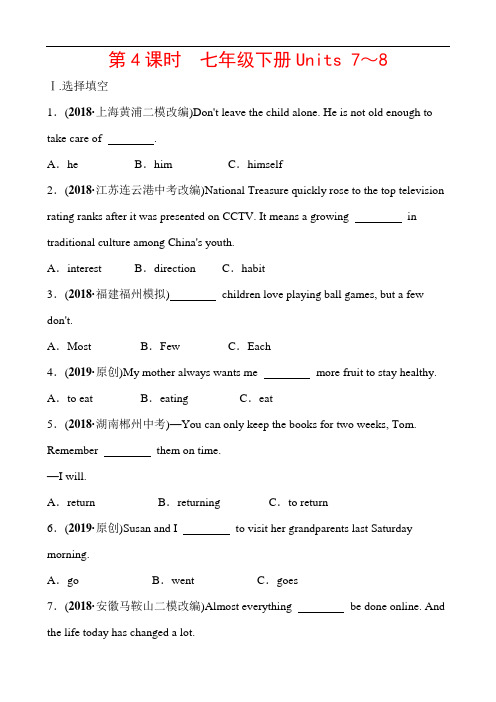
第4课时七年级下册Units 7~8Ⅰ.选择填空1.(2018·上海黄浦二模改编)Don't leave the child alone. He is not old enough to take care of .A.he B.him C.himself2.(2018·江苏连云港中考改编)National Treasure quickly rose to the top television rating ranks after it was presented on CCTV. It means a growing in traditional culture among China's youth.A.interest B.direction C.habit3.(2018·福建福州模拟) children love playing ball games, but a few don't.A.Most B.Few C.Each4.(2019·原创)My mother always wants me more fruit to stay healthy. A.to eat B.eating C.eat5.(2018·湖南郴州中考)—You can only keep the books for two weeks, Tom. Remember them on time.—I will.A.return B.returning C.to return6.(2019·原创)Susan and I to visit her grandparents last Saturday morning.A.go B.went C.goes7.(2018·安徽马鞍山二模改编)Almost everything be done online. And the life today has changed a lot.A.must B.can C.should8.(2018山东·潍坊模拟改编)Mary's dog is very . It is safe to touch him if you want to.A.dangerous B.brave C.friendly9.(2019·原创)Sally used to be shy, but now she enjoys new friends. A.meeting B.meet C.to meet10.(2019·原创)—Don't too late, or you will fell tired in class.—I won't, mom.A.call up B.wake up C.stay upⅡ.完形填空(2018·安徽合肥包河一模改编)On June 2, 1886, a German threw a message in a bottle into the water while his ship crossed the Indian Ocean. Around 132 years later in January, the bottle was 1 on the Australian coast, making it the oldest-known message in a bottle in the world.The bottle was thrown into the water to study ocean currents(洋流). But throwing messages in bottles into the ocean is not just for 2 . People send out such messages for many reasons. Some people write information about themselves in 3 of finding a pen friend. 4 write down secrets, hoping that waves will 5 those secrets. And still other people just write down some jokes, songs or anything else they think might be 6 .The reasons and ways might be different, but the 7 is always the same: To reach out and try to connect 8 someone. This kind of shared feeling might be9 this tradition has remained popular for so long. In 1989, the British band ThePolice wrote a song called Message in A Bottle that described this 10 :A hundred billion bottles washed up on the beach. “Seems I'm not alone at being alone,” the singer said.1.A.sold B.showed C.found2.A.scientists B.tourists C.friends3.A.fears B.hopes C.worries4.A.Another B.Other C.Others5.A.put off B.wash away C.pick up6.A.fun B.dangerous C.terrible7.A.price B.speed C.goal8.A.with B.by C.into9.A.what B.why C.how10.A.result B.feeling C.situationⅢ.阅读理解(2017·福建中考)I was traveling alone through the UK. To reach places that were off the public transportation map, I bought an old car, which cost most of my money.I couldn't afford to stay in the hotel, so I had to camp in my car for the rest of the trip.One morning I awoke in my old car on a country road in Ireland and saw a single house. The water in my thermos(保温瓶) had gone cold, so I knocked on the door of the house. A woman opened it. I asked her for some hot water. But she wouldn't let me get away with just that! I was invited indoors. She asked me to sit at the table and have breakfast with her family. They filled my thermos before I left.I was greatly moved. And I decided to pass the kindness on. The other day I met ayoung man who had been driving around to look for a parking lot. He looked increasingly upset. I was glad that I was able to point one out to him. His thankful smile was the hugest reward(奖赏) for me.1.The writer bought the car in order to .A.serve the publicB.travel more easilyC.take the trip aloneD.save more money2.Why did the writer camp in his car?A.He was short of money.B.It was his habit.C.He could have a better rest.D.It would be warmer.3.The writer asked the woman for .A.a mapB.a thermosC.some hot waterD.a light breakfast4.How did the young man feel at last?A.Funny.B.Upset.C.Disappointed.D.Thankful.5.What's the main idea of the text?A.Traveling alone is interesting.B.Sharing food is a pleasure.C.Kindness is the sunshine in life.D.Smile is important to everybody.Ⅳ.情景交际根据情景提示,完成下列各题。
仁爱版中考英语一轮复习词汇模板(七年级上册)课件 (1)

鼠
牛 ox/ cow 龙 蛇 马 羊 猪
鹿
长颈鹿 蜜蜂 蝴蝶 蚂蚁 狼 熊
青蛙
鲸鱼 猫头鹰 考拉 鹅 鹰 鲨鱼
十二.时间 time
点钟 一半 四分之一 上午(缩写) 下午(缩写) 昨天 今天 明天
早上 下午 傍晚 中午 夜晚 深夜
年 月 天 小时 分钟 秒钟
十三.物品 things
橡皮
钢笔 铅笔 书本 尺子 铅笔盒 书包
八.颜色 color
黑色 白色 红色 橙色 黄色 绿色
蓝色
紫色
粉色
棕色
金黄色
灰色
白发
九.衣物 clothes
衬衫 T恤衫 鸭舌帽 帽子 外套 连衣裙 短裙
鞋子 手套 眼镜 墨镜 夹克 裤子 短裤
十.食物
1.水果 fruit
苹果 橙子 草莓 柠檬 芒果 西瓜
香蕉 梨子 桃子 葡萄 樱桃 椰子
十.食物
不同的
短的;矮的 强壮的
可爱的
凉爽的
虚弱的 炎热的
友好的
高兴的
难过的
亲爱的,昂 贵的 幸福的
最喜爱的
初级的
十五.动词
be动词(是):
谢谢
尝试
飞
唱
欢迎
预定
问
买
遇见
知道
有
去
看见
帮助
猜
来
看起来 原谅 拼写
喜欢 意思是 想要
说(内容) 读 说(语言) 教 拿,带 让
情态动词:can
may need
will
my
mine
myself
二.称呼
1.
先生 先生
Man
woman
初中英语总复习材料(仁爱版)
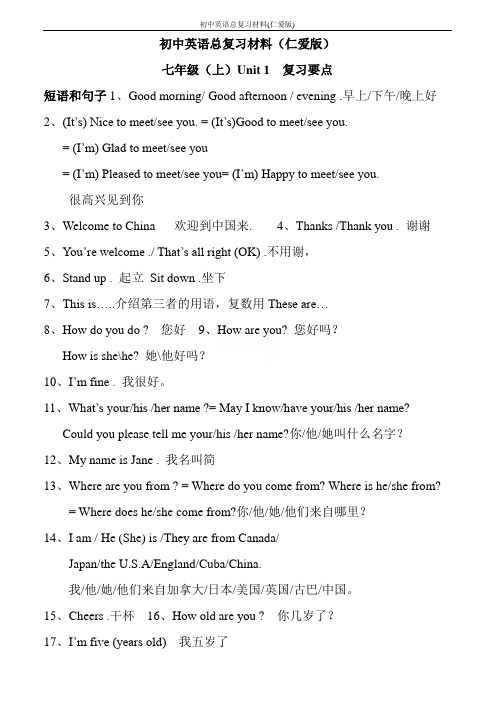
初中英语总复习材料(仁爱版)七年级(上)Unit 1 复习要点短语和句子1、Good morning/ Good afternoon / evening .早上/下午/晚上好2、(It’s) Nice to meet/see you. = (It’s)Good to meet/see you.= (I’m) Glad to meet/see you= (I’m) Pleased to meet/see you= (I’m) Happy to meet/see you.很高兴见到你3、Welcome to China 欢迎到中国来.4、Thanks /Thank you . 谢谢5、You’re welcome ./ That’s all right (OK) .不用谢,6、Stand up . 起立Sit down .坐下7、This is…..介绍第三者的用语,复数用These are…8、How do you do ? 您好9、How are you? 您好吗?How is she\he? 她\他好吗?10、I’m fine . 我很好。
11、What’s your/his /her name ?= May I know/have your/his /her name?Could you please tell me your/his /her name?你/他/她叫什么名字?12、My name is Jane . 我名叫简13、Where are you from ? = Where do you come from? Where is he/she from?= Where does he/she come from?你/他/她/他们来自哪里?14、I am / He (She) is /They are from Canada/Japan/the U.S.A/England/Cuba/China.我/他/她/他们来自加拿大/日本/美国/英国/古巴/中国。
仁爱英语九年级上册unit1复习
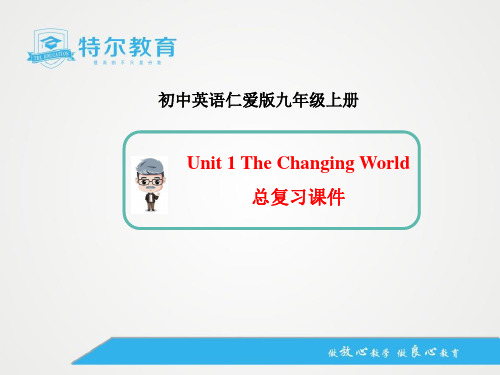
Unit 1 The Changing World 总复习课件
内容大纲
1
词汇训练营
2
短语大闯关
3
重点句子
4
语法加油站
词汇训练营
熟词新义:
1.supply v.提供,供应 n.供应量;补给;供应
2.offer v.提供(东西或机会);主动提出 n.提议;报价
3.wound n.创伤;伤口 v.伤;伤害
A. has been to
B. has gone to
C. have been to
D. goes to
A 2. Great changes ______ in my hometown.
A. have taken place
B. take place
C. have happenednit 1 Topic1
1.去过某地
_______h__a_v_e_/__h_a_s__b_e_e_n to
2.去某地了
________h_a_v_e__/_h_a_s__g_o_n__e to
3.向某人学习
________le_a_r_n__(_s_t_h_.)__fr_o_m__ sb
municate v. __________n.通讯;交流;交往 10.satisfy v. __________ adj.令人满意的;
__________ adj.满意的;满足的;欣慰的 11.hide v. __________ (过去式)躲藏;遮挡;隐瞒
__________ (过去分词) 12.visit v. __________n.游客;来访者;参观者 13.manage v. __________ n.经理,经营者,老板 14.train v. __________ n.训练,培训 15.steal v. __________(过去式)偷;窃取
仁爱版英语中考总复习-教材过关第6讲-随讲同步训练-八年级上册Unit 2(有答案)
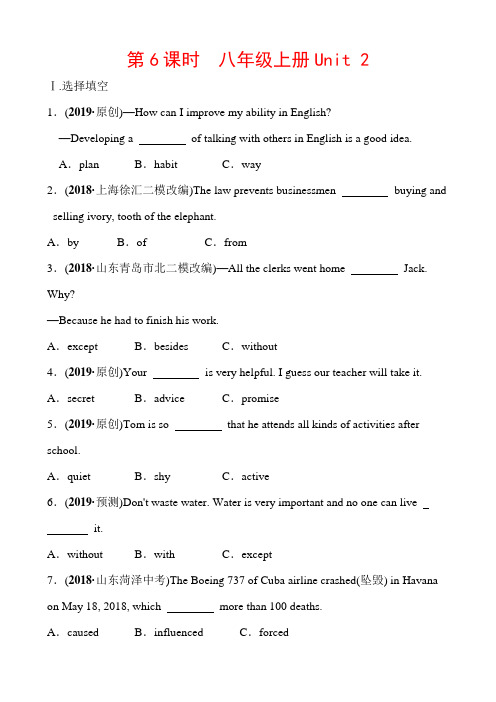
第6课时八年级上册Unit 2Ⅰ.选择填空1.(2019·原创)—How can I improve my ability in English?—Developing a of talking with others in English is a good idea. A.plan B.habit C.way2.(2018·上海徐汇二模改编)The law prevents businessmen buying and selling ivory, tooth of the elephant.A.by B.of C.from3.(2018·山东青岛市北二模改编)—All the clerks went home Jack. Why?—Because he had to finish his work.A.except B.besides C.without4.(2019·原创)Your is very helpful. I guess our teacher will take it. A.secret B.advice C.promise5.(2019·原创)Tom is so that he attends all kinds of activities after school.A.quiet B.shy C.active6.(2019·预测)Don't waste water. Water is very important and no one can live it.A.without B.with C.except7.(2018·山东菏泽中考)The Boeing 737 of Cuba airline crashed(坠毁) in Havana on May 18, 2018, which more than 100 deaths.A.caused B.influenced C.forced8.(2019·原创)My sister was writing an e-mail my father watching TV at this time yesterday.A.until B.after C.while9.(2019·预测)The National Public Memorial Day of Nanjing Massacre is a day that all the Chinese always keep in mind.A.can B.should C.may10.(2019·预测)Mrs. Smith planned to go hiking with her friend. But they stayed at home going out because of the rainy day.A.instead of B.thanks to C.as forⅡ.完形填空(2019·原创)Ten years ago I used to be very healthy. I 1 bike to work and I got a lot of exercise at the weekend. I used to play tennis a lot and go for long walks. In those days I didn't make so much 2 . I had a job in an office. My job wasn't very good at that time, 3 I had a lot of time to do the things I enjoyed doing. Then, about eight years ago, I got a much 4 job. The pay was higher. But the hours were longer a lot, too. I bought a car. I began to drive to work every day and take people out to lunch. And I began to 5 weight, too. I stopped playing tennis and didn't go for long walks anymore, 6 I just have no time for things like that.There's a lot of stress in a job for me, I started drinking more than I used to. I started smoking a lot, too. I never used to smoke at all.Two months 7 I had a heart attack(发作). At first I just couldn't believe it.8 ,it wasn't very serious I was in hospital for a few days. The doctor 9 me to stop drinking and smoking and to eat less. He also advised me to work less and getmore exercise. Sometimes I wonder if I should get another job. But if I do that, I won't make so much money. I just don't know 10 I should do.1.A.rode B.took C.bought2.A.paper B.money C.happiness3.A.but B.and C.so4.A.cleaner B.busier C.better5.A.put on B.put up C.put out6.A.if B.because C.when7.A.before B.after C.ago8.A.Possibly B.Especially C.Luckily9.A.advised B.made C.took10.A.how B.what C.whereⅢ.阅读理解阅读下面短文,从短文后所给的五个选项中选出能填入短文空白处的最佳选项,使短文通顺、连贯,意思完整。
中考总复习之仁爱版、人教版教材初中英语语法初中8大时态结构
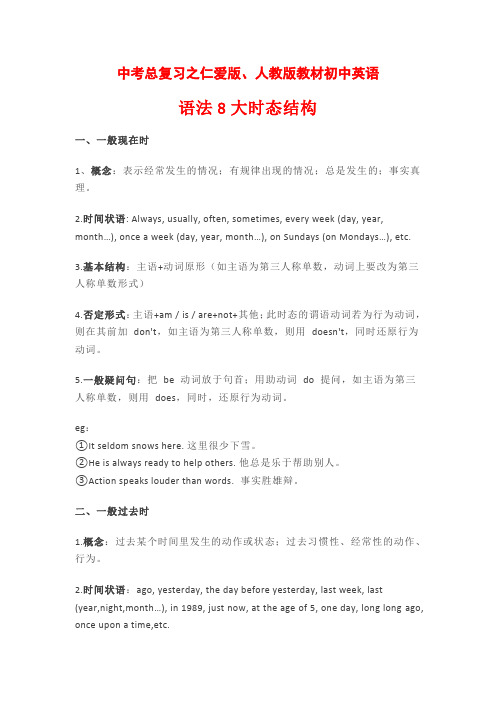
中考总复习之仁爱版、人教版教材初中英语语法8大时态结构一、一般现在时1、概念:表示经常发生的情况;有规律出现的情况;总是发生的;事实真理。
2.时间状语: Always, usually, often, sometimes, every week (day, year, month…), once a week (day, year, month…), on Sundays (on Mondays…), etc.3.基本结构:主语+动词原形(如主语为第三人称单数,动词上要改为第三人称单数形式)4.否定形式:主语+am / is / are+not+其他;此时态的谓语动词若为行为动词,则在其前加don't,如主语为第三人称单数,则用doesn't,同时还原行为动词。
5.一般疑问句:把be 动词放于句首;用助动词do 提问,如主语为第三人称单数,则用does,同时,还原行为动词。
eg:①It seldom snows here.这里很少下雪。
②He is always ready to help others.他总是乐于帮助别人。
③Action speaks louder than words. 事实胜雄辩。
二、一般过去时1.概念:过去某个时间里发生的动作或状态;过去习惯性、经常性的动作、行为。
2.时间状语:ago, yesterday, the day before yesterday, last week, last (year,night,month…), in 1989, just now, at the age of 5, one day, long long ago, once upon a time,etc.3.基本结构:主语+动词的过去式或be 的过去式+名词4.否定形式:主语+was / were+not+其他;在行为动词前加didn't,同时还原行为动词。
5.一般疑问句:was 或were 放于句首;用助动词do 的过去式did 提问,同时还原行为动词。
仁爱版七年级英语上册总复习完整版
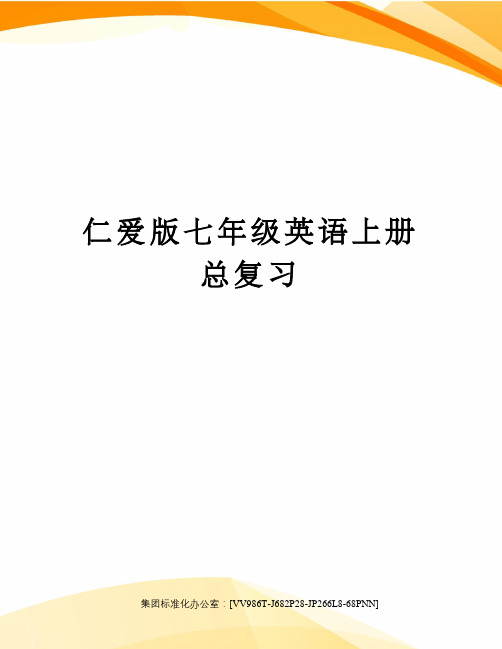
仁爱版七年级英语上册总复习集团标准化办公室:[VV986T-J682P28-JP266L8-68PNN]英语七年级上册知识点归纳Unit11、Goodmorning/afternoon/evening早上/下午/晚上好Goodnight晚安(晚上告别)2、glad/nicetomeet/seeyou见到你很高兴(回答也一样)3、welcometo+地点欢迎来到……(回答:Thankyou或者Thanks)4、let’s+V让我们做……(原)5、standup起立sitdown坐下6、thisis-----这是……(用于介绍第三者的用语)7、Howdoyoudo你好(回答也是:Howdoyoudo)8、Howareyou你好吗Fine,thankyou.andyou很好;谢谢;你呢I’mOK/I’mfine,too.我也很好。
9、seeyou=seeyoulater=seeyousoon=good-bye再见10、excuseme打扰一下;请问11、I’m-----=mynameis----我是……12、befrom=comefrom来自13、inEnglish用英语14、CanyouspellitYes/No你能拼写它吗能/不能15、That’sOK/That’sallright/You’rewelcome/Notatall不用谢16、……yearsold?……岁17、telephonenumber电话号码QQnumberQQ号码IDnumber身份证18、thesame(相同的)反义词是different(不同的)例:Weareinthesamegrade,butweareindifferentclasses.句型:1.Whatisyourname你的名字是什么2.Where+be+主语+from某人来自于哪里(回答:主语+be+地点)Whereareyoufrom?Iamfromquanzhou.3.Howold+be+主语某人几岁(回答:主语+be+数字)例:Howoldareyou?I’mforteen.4.Whatisyourtelephonenumber你的电话号码是多少(回答:Mytelephonenumberis----或者It’s-------)注意:读出号码的时候要逐个读出。
(完整版)仁爱英语中考九年级全一册知识点总复习整理版
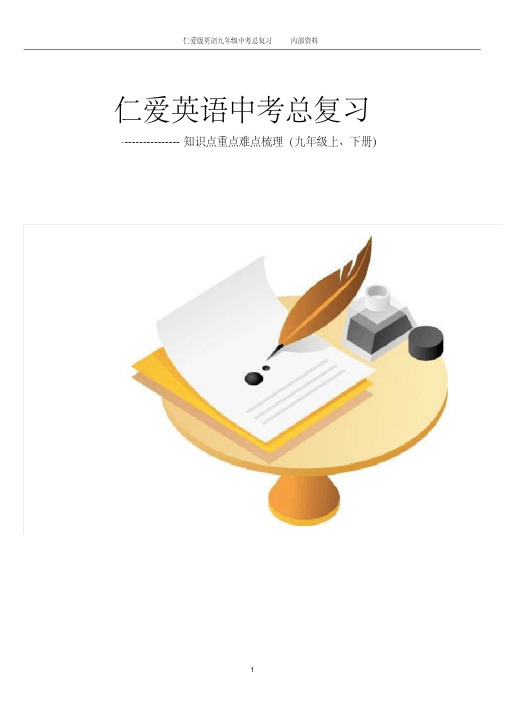
仁爱英语中考总复习----------------知识点重点难点梳理(九年级上、下册)九年级(上)Unit 1Unit 1 Topic 1短语take photos 照相so…that 如此……以致于have /has been to 到过an English training school 一所英语培训学校在地take part in 参加 a disabled child 残疾儿童learn…from 从……学会around the world 全世界in the past 在过去in detail 详细地no chance 没机会make money 赚钱give support to 为某人提供帮助get a good education 得到好的教育have/has gone to 到过by the way 顺便问一下search the internet 上网used to be 去过曾经是with the development of China 随着中国的发展at sunrise 日出时grow cotton 种植棉花go hungry 变得很饿shout at 对…… 喊叫divide…into 把……分成send…to 把……送到…… at that time 在那时feel satisfied with 对……满意be used to do sth. 被用来做…… more than 超过during the vacation 在假期期间living condition 生活条件in recent years 在近几年make progress 取得进步live in present 立足现在dream about 展望未来happen to somebody/something ( 事情)发生在……身上,临到……头上happen to do something 碰巧thanks to 因为……,the capital of China中国首都host the 2008 Olympic Games 举办2008奥运会stand for 代表as well 也prepare for为…… 做准备taken place 发生with the help of 在……帮助下1.spend time (in) doing something 花费时间做某事2.see somebody doing something 看见某人做某事3.There goes the bell. 铃响了。
- 1、下载文档前请自行甄别文档内容的完整性,平台不提供额外的编辑、内容补充、找答案等附加服务。
- 2、"仅部分预览"的文档,不可在线预览部分如存在完整性等问题,可反馈申请退款(可完整预览的文档不适用该条件!)。
- 3、如文档侵犯您的权益,请联系客服反馈,我们会尽快为您处理(人工客服工作时间:9:00-18:30)。
初中英语总复习材料(仁爱版)七年级(上) Unit 1复习要点短语和句子1、Good morning/ Good afternoon / evening .早上 /下午 /晚上好2、(It’ s) Nice to meet/see you. = (It’ s)Good to meet/see you.= (I’ m) Glad to meet/see you= (I’ m) Pleased to meet/see you= (I’ m) Happy to meet/see you.很高兴见到你3、Welcome to China欢迎到中国来.4、Thanks /Thank you . 谢谢5、You’ re welcome ./ That’ s all right不(OK)用谢,.6、Stand up . 起立 Sit down . 坐下7、This is介..绍第三者的用语,复数用These are8、How do you do ?您好9、 How are you? 您好吗?How is she\he? 她他好吗?10、 I ’ m fine 我.很好。
11、What’ s your/his /her name ?= May I know/have your/his /her name?Could you please tell me your/his /her name?你 /他 /她叫什么名字?12、 My name is Jane . 我名叫简13、 Where are you from ? = Where do you come from? Where is he/she from?= Where does he/she come from?你 /他/她/他们来自哪里?14、 I am / He (She) is /They are from Canada/Japan/the U.S.A/England/Cuba/China.我 /他/她/他们来自加拿大 /日本 /美国 /英国 /古巴 /中国。
15、 Cheers .干杯16、 How old are you ?你几岁了?17、 I ’ m five (years old) 我五岁了18、 What’ s your phone number你?的电话号码是多少?My telephone number is= It’ s..19、 What class /grade are you / is he /she in ?你/他/她在哪个班级 /年级?20、 I am / He /She is in Class Four , Grade One 我./他/她在一年级四班。
21、 Who is that ?那是谁?22、 That ’ s Lucy那是露西。
.23、 What’s this / that in English ?It ’ s这/那用英语怎么表达?24、 This / That is an orange 这/那是一个桔子。
.25、What are these / those ? 这/那些是什么?26、 They are schoolbags / books /buses它.们是书包 / 书/公共汽车。
27、Is this /that a telephone ? 这 /那是一部电话吗?28、Yes, it is.\ No, it isn’ t.29、 Are these /those pencils ?这些是铅笔吗?30、No, they aren’ t.31、 How do you spell it 你是怎么拼写它的?M — A —P, map.32、 Can you spell it? Yes, M—A —P, map.33、Excuse me . 请问,打扰了34、 in the same class 在相同的班级35、 good friend 好朋友36、.Mr. Mrs Miss Ms 用于姓之前(Mr. 表示先生,是对中年男子的尊称,婚否不限;Mrs 表示夫人,是对中年已婚女子的称呼:Ms,是对不知婚否女子的称呼;Miss 是对未婚女子或老师的称呼)语法1、 be 中 am、is、 are 的基本用法 ,区别及其引导的一般疑问句和回答 . am 接在I 之后, is 放在单数的名词或代词之后, are 放在复数的名词或代词之后,否定句在 be 后加 not,一般疑问句将 be 提前。
回答:Yes,人称代词 + be./ No, 人称代词 +be + not.He is Mr. Chen.He is not Mr. Chen.Is he Mr. Chen?Yes, he is. / No, he is not.I am a student.I am not a student. Are you a student?Yes, I am. / No, I am not.They are teachers. They are not teachers. Are they teachers?Yes, they are. / No, they are not.2.名词的复数:1)一般在名词词尾加—s car---cars; apple--apples2)以 s,x,ch,sh 结尾的词,在词尾加 ---es,如:box---boxes; bus---buses; watch ---watches.3)部分国人的复数:以an 结尾的单词,在词尾加—s;以结尾的单词,单复数同形。
如:Chinese---Chinese, Japanese---Japanese, American---Americans Brazilian —Brazilians, Canadian---Canadians.3)以辅音字母 +y 结尾,变 y 为 i 再加 es,如: family---families.5)以 fe、f 结尾,变 fe、f 为 ve 再加 s,如: life---lives.6)特殊情况,如:mouse---mice; foot---feet,tooth--teeth, Chinese--Chinese, Japanese--Japanese3. 基数词的表达: 0—100 zero one two three four five six seven eight nine teneleven twelve thirteen fourteen fifteen sixteen seventeen nineteen twentytwenty-one thirty forty fifty sixty4.a,an,the的用法 : a /an 都表示“一,一个”,如果单词的音标是元音音标开始的,我们在前用an, an apple / a‘u’;/ an‘s’Unit 2 Looking DifferentTopic 1small - big / large / wide long - short black –white tall - short3young –old new - old1. a small nose 一个小鼻子2. a big head 一个大头3. long\short hair 长 /短头发4. a wide mouth 一个大嘴巴5. round faces 圆脸6. your favorite movie star 你最喜爱的电影明星7. guess again 再猜8. a good student 一个好学生9. have a sister 有一个姐妹10. her/his name 他/她的名字11. in the same school 在同一所学校12. in different grades 在不同的年级13. Your face is long . = 14. His hair is short. =15.Do you have long hair? Yes, I do. No, I don’ t.Yes, we do. No, we don’ t.16.Does she / he have big eyes? Yes, she / he does. No, she / hedoesn ’ t.17. Do they have new friends?Yes, they do. No, they don’ t.10. I know. 我知道 I don’t know. 我不知道。
I see.我明白11.I ’m thirteen years old. = I ’m13 years old.= I ’m13. =I ’m thirteen. Topic21. What does she look like? 她看起来怎么样?2. that boy 那个男孩3. my friend 我的朋友4.look the same=have the same looks看起来一样5. look different =have different looks 看起来不一样6. blond hair and blue hair 金发碧眼7. good friend好朋友8.表示颜色的词语 : What’ s颜色 and 颜色 ? It ’ s9.关于颜色的提问: What color ?--What color is the skirt? -- It ’s white.--What color are the shirts? - They are white.10.give something to somebody= give somebody something 给某人某物Give the book to Maria = Give Maria the book.把书给Maria.11. short brown hair12. look at the photo\ picture 看着这张照片13. look (at) = have a look (at)14. the girl in yellow = the girl in a green skirt 15.in 可表示“用某种语言在 ..里面,穿着”in English in the morning \ afternoon \ evening in a green carin a red coat in red16. which 疑问词的使用Which girl? The girl in red.哪个女孩?穿红色衣服的那个女孩。
